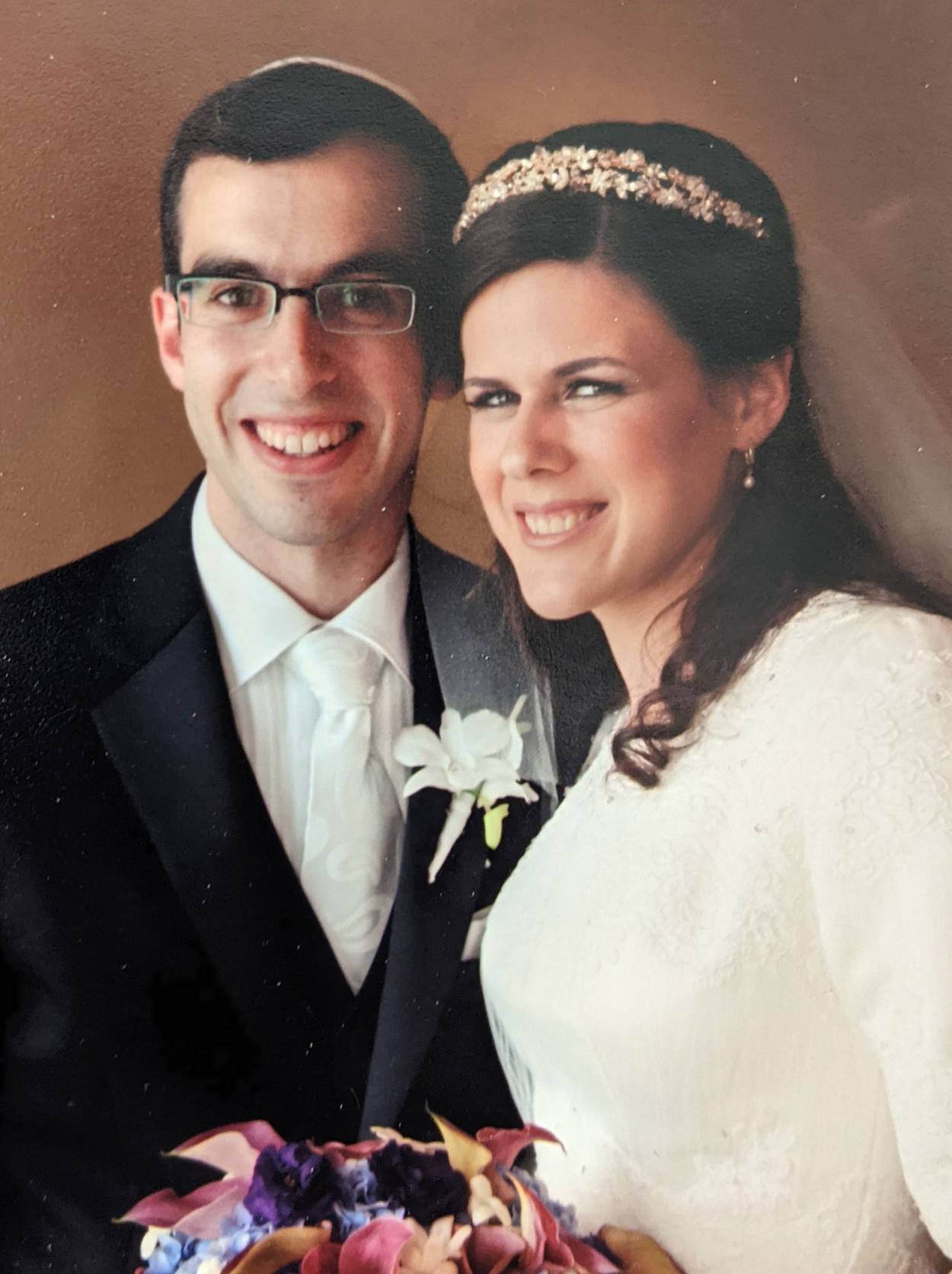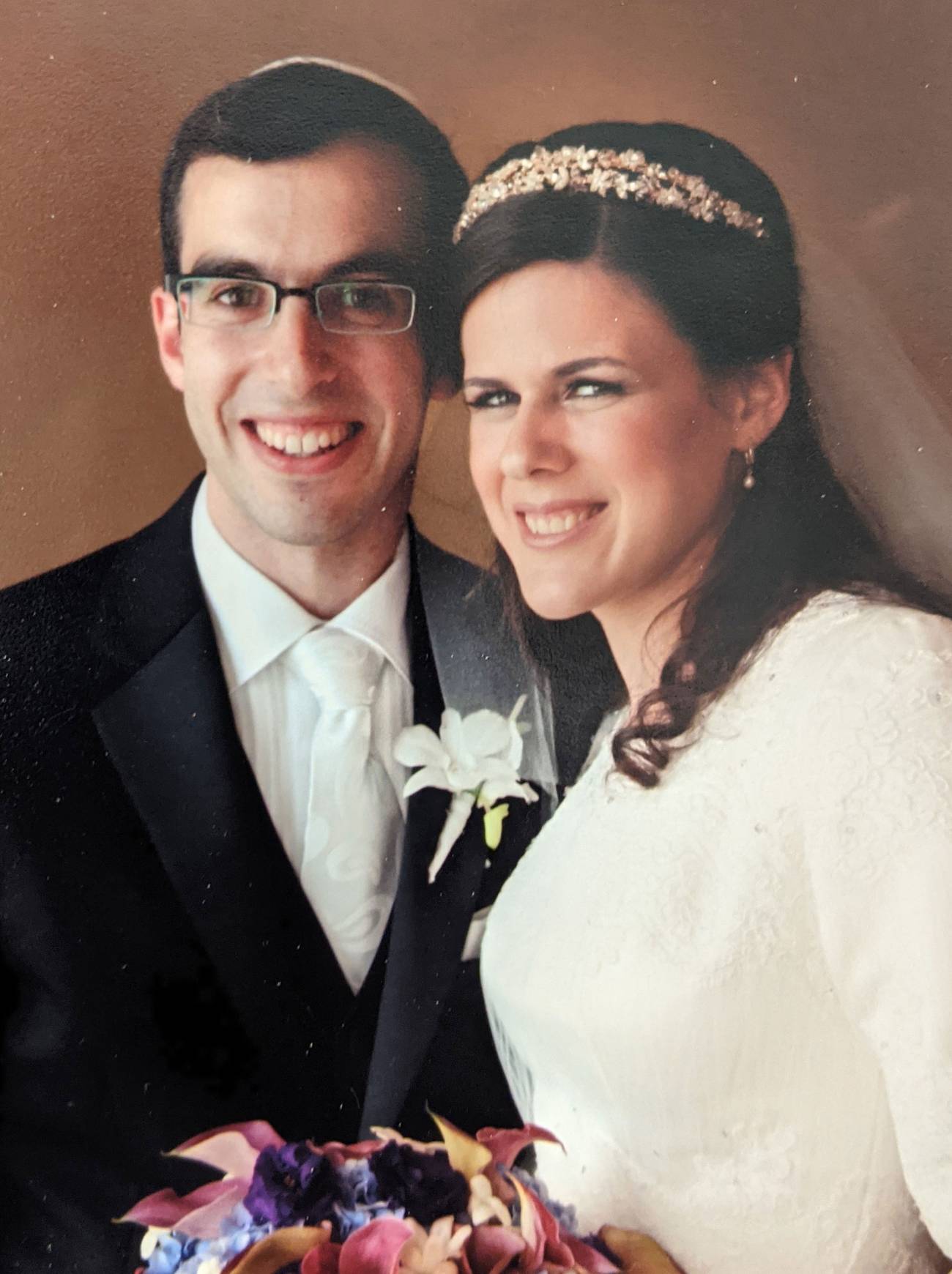When Competition Spurs Romance
Every year, young scholars gather in Israel for Chidon HaTanach—the International Bible Contest. But sometimes, those who begin as rivals end up under the chuppah.




When Noah Notis and Atara Kelman got married in July 2020—due to the pandemic, they had just 25 guests in Kelman’s backyard in Toronto—it was the culmination of a relationship that began four years earlier in Israel, where they’d originally been rivals. Both bride and groom were contestants at the Chidon HaTanach (International Bible Contest): Notis representing the United States, and Kelman representing Canada.
Each year, thousands of the brightest and best students from Israel and around the world compete in regional and national competitions to earn a coveted place in the Chidon finale. The competition, founded in 1958, by Israel’s first prime minister, David Ben-Gurion, aims to connect diaspora Jews with the Bible and their Jewish heritage.
Broadcast live on Israeli television at 11 a.m. on Yom Ha’Atzmaut (Israeli Independence Day), it evokes cult status, even being parodied on Israeli television. With thousands of Israelis, religious and nonreligious alike, glued to their television screens, in most countries this would be akin to one of the biggest sporting games of the year. But at the Chidon, the competition centers on contestants being asked difficult questions about obscure facts and books in the Bible.
The quiz begins two weeks earlier when participants from as many as 30 countries arrive in Israel to participate in a preparatory camp and tour of Israel. Competitors are treated like VIPs, meeting with dignitaries such as the Israeli prime minister, president, and minister of education.
“There is a certain common denominator for people coming to compete in the Chidon,” said Kelman. “While overall it is a very diverse group of people, the people who are similar to you already have certain things in common, such as a commitment to learning Tanach seriously and taking on extra projects outside of school hours.”
But Kelman and Notis are certainly not the only ones who have met their significant other at the Chidon.
Amihai Bannett is the director of Chidon HaTanach at the Jewish Agency, which is in charge of overseeing and organizing the Chidon, as well as recruiting, preparing, and bringing contestants from Jewish communities around the world to the two-week Tanach Camp.
Since starting his role in 2012, Bannett can think of six or seven couples who met at the Chidon and later got married, just in the past decade. “The [Chidon] is a meeting of like-minded people who are passionate about the Tanach and Israel,” he said. “This combination sparks wonderful connections.”
Agreeing with this sentiment is another couple who met at the 2004 Chidon: Dani Lent Halpern from the United States and Yoni Halpern from Canada. Their romance was not immediate; rather it blossomed in the years after their initial meeting at the Chidon. As Dani recently told Tablet: “We kept in touch intermittently after [the contest] and saw each other occasionally through mutual friends but didn’t start dating until many years later; actually, we got more back in touch planning a Chidon reunion!”
Dani thinks that the Chidon served as a wonderful backdrop to them meeting, as it “brings together young people who are serious about their Torah knowledge ... and [are] maybe just a wee bit competitive. It gives you a chance to see people when they are focusing on something they really want, as well as when they are having fun because of how the program is structured. We both knew we were coming with similar values.”
Itzhaki Felhimer is an Israeli who has been involved in running the Chidon HaTanach camp since 1991, including planning the program, selecting staff for the camp, and ensuring the safety of all Chidon HaTanach competitors from the moment they arrive in Israel until they fly back to their home countries. He thinks that many couples who meet at the Chidon end up married because they share a common interest in the Bible. “I think couples bond over the fact that they are outside their home [countries], in an intensive camp with competitors from different places, with common values and often a similar religious background,” he said.
This was certainly true for Jenny and Matthew Disler, who met at the 2012 quiz. Jenny, from England, and Matthew, from South Africa, met at the Chidon, with Jenny recalling that “we became friends over the two-week camp and spent lots of time together, sharing thoughts and ideas.”
Jenny thinks the camp was a good place to meet. “Young, like-minded people came together for their love of Tanach and Israel, which was amazing to see from all four corners of the earth,” she said. “It was a safe space where we had our independence to meet each other and develop a friendship which later became a relationship.”
While Felhimer can recall many non-Israeli couples who met and subsequently married over the years, he can only recall one Israeli couple who married. In 2018, Israelis Azriel Shilat and Oriah Cohen competed in the final round of the competition, with Shilat narrowly beating Cohen. A year and a half after they competed against each other, they were engaged and married. When I contacted them recently, Shilat was apologetic that she could not provide a comment, as she had just delivered the couple’s first baby.
While COVID-19 restrictions mean that 2021 will be the second year in a row that the Jewish Agency will be running the Chidon virtually, livestreaming at 11 a.m. Israel time on April 15, many of the activities that connect Jewish participants from around the world will be adapted to an online format. “Dozens of Chidon participants will take part in both the preliminary test and educational tours and activities with their peers from around the world, all virtually,” said Bannett. “All this will culminate in the final round on Yom Ha’Atzmaut, live on Israeli National Television, with the prime minister and Jewish Agency Chairman Isaac Herzog in attendance, just like every year—only unfortunately, the diaspora champions will be joining via live video conference.”
While the virtual format of the quiz is likely, for now, to prevent more couples meeting, the next generation of offspring, who had both parents compete in the Chidon, may soon be gracing the competition themselves.
“We just told our oldest daughter [who is] 6 years old that we met at a Torah contest and she was really interested in doing it when she got older,” said Dani Lent Halpern. “If any of our children wanted to participate, we would definitely support them, but it is by no means mandatory.”
In this vein, it is likely that the Chidon will continue to serve as a good place for couples to meet, with Jenny Disler noting, “I think we would like to encourage [any of our children to participate]—but with no pressure!”
Nomi Kaltmann is Tablet magazine’s Australian correspondent. Follow her on Twitter @NomiKal.